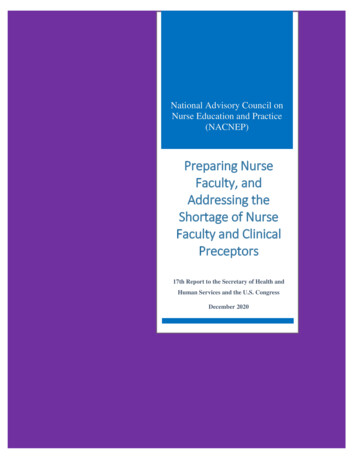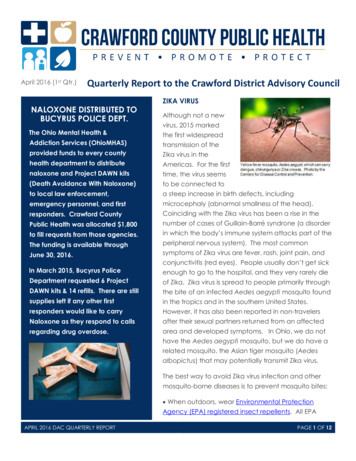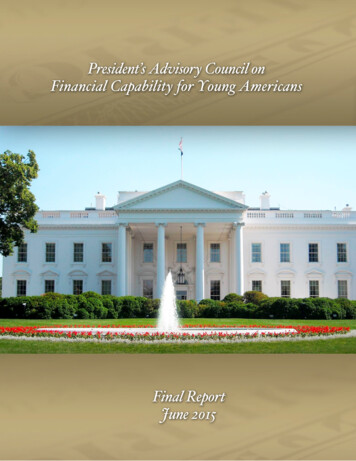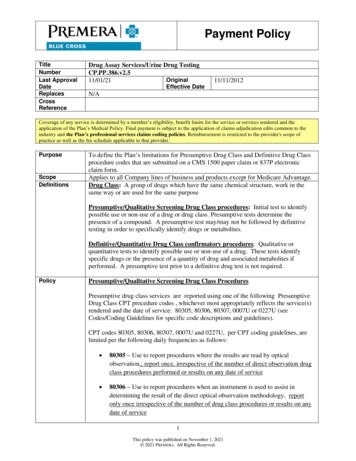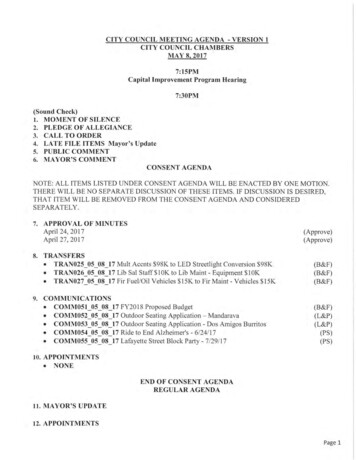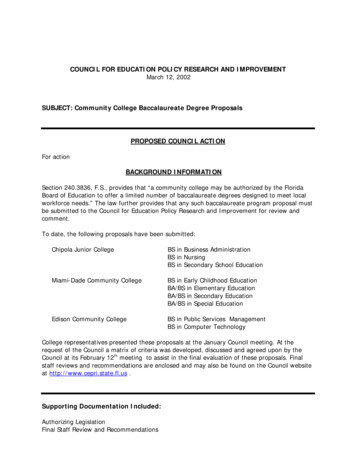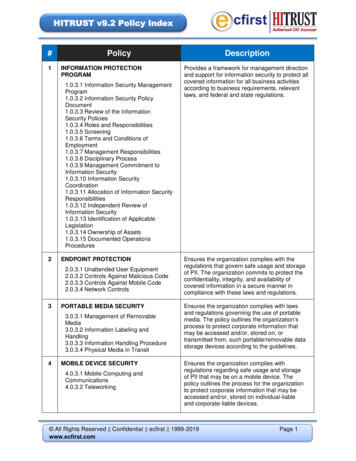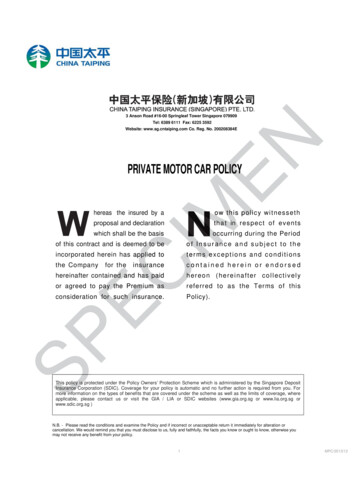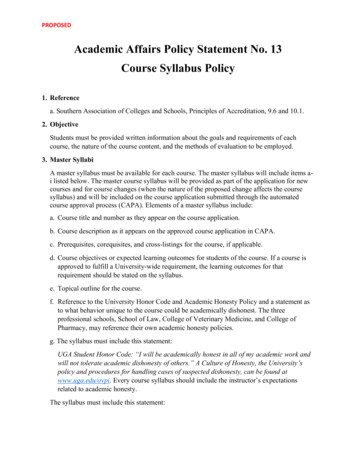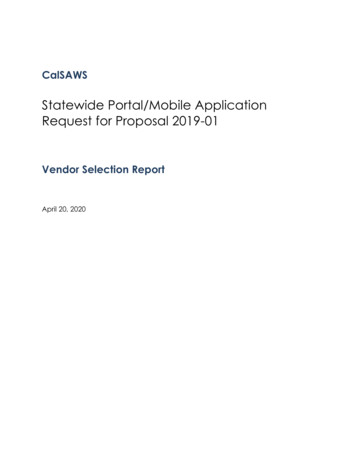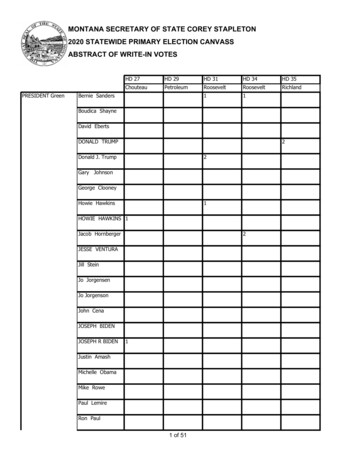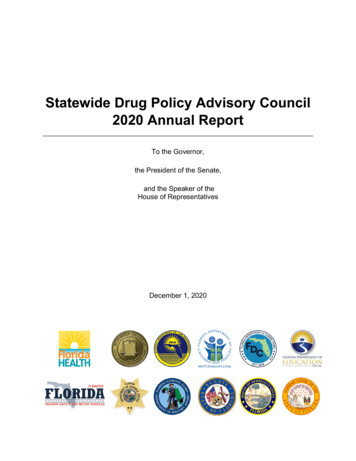
Transcription
Statewide Drug Policy Advisory Council2020 Annual ReportTo the Governor,the President of the Senate,and the Speaker of theHouse of RepresentativesDecember 1, 2020
Table of ContentsStatewide Drug Policy Advisory Council Members and Designees . 1Acronyms Used in this Report . 2Message from the State Surgeon General Scott A. Rivkees, MD . 5Summary of 2020 Meetings Statewide Drug Policy Advisory Council . 72020 Recommendations Statewide Drug Policy Advisory Council . 9Executive Summary . 12Statewide Drug Policy Advisory Council Completed Recommendationsfrom Previous Annual Reports . 202020 Recommendations . 21Prevention . 23Treatment and Recovery . 30Data Collection and Surveillance . 44References. 45
Statewide Drug Policy Advisory CouncilMembers and DesigneesDepartment of Health Scott A. Rivkees, MDState Surgeon GeneralDepartment of Juvenile Justice Simone MarstillerSecretary Tracy Shelby PhDDirector Mental Health and Substance Abuse ServicesFlorida Attorney General The Honorable Ashley Moody Rachel KamoutsasDeputy General CounselDepartment of Military Affairs Adjutant General James O. Eifert COL John L. SteeleDirector of Military Support,Florida National GuardOffice of Policy and Budget Chris SpencerPolicy Director Walter LiebrichSenior AnalystFlorida Senate The Honorable Darryl RousonFlorida Department of Law Enforcement Rick SwearingenCommissioner Annie WhiteAssistant Special Agent in ChargeOffice of Statewide IntelligenceFlorida House of Representatives The Honorable Cary PigmanSupreme Court Appointee Judge Steve LeifmanJudiciary Member Aaron GersonOffice of the State Courts AdministratorDepartment of Children and Families Chad PoppellSecretary Jeffrey Cece, MS, CPMOffice of Substance Abuse and Mental HealthGubernatorial Appointees Mark P. FontaineExecutive AdvisorFlorida Behavioral Health Association Dotti Groover-SkipperFounder, President and CEOHeartdance Foundation, Inc. Doug Leonardo, LCSWSr. VP Operations and DevelopmentCentral and NorthChrysalis Health Peggy SappPresident, CEOInformed Families/The Florida Family Partnership Kimberly K. SpenceCEO Keaton Corrections Roaya TysonCOO Gracepoint John VanDelinder, PhDExecutive DirectorSunshine State Association of Christian SchoolsDepartment of Corrections Mark InchSecretary Maggie AgertonBureau ChiefSubstance Use Treatment ServicesDepartment of Education Richard CorcoranCommissioner Nichole WilderDirector, Office of Healthy SchoolsFlorida Highway Safety and Motor Vehicles Terry RhodesExecutive Director Colonel Gene SpauldingDirectorStaff Liaison Nathan Dunn, MSA1
Acronyms Used in this ReportACEAdverse Childhood ExperienceACGMEAccreditation Council for Graduate Medical EducationAHCAAgency for Health Care AdministrationAMAAmerican Medical AssociationAPIApplication Programming InterfaceASTHOAssociation of State and Territorial Health OfficialsBCORBuilding Communities of RecoveryCATCommunity Action TeamCDCCenters for Disease Control and PreventionCDPCommunity Driven ProductCEOChief Executive OfficerCHDCounty Health DepartmentCHIPCommunity Health Improvement PlanCMOChief Medical OfficerCMSCase Management SystemCNPPAChild Nicotine Poisoning Prevention ActCOPSCommunity Oriented Policy ServicesDATA 2000Drug Addiction Treatment Act of 2000DCFFlorida Department of Children and FamiliesDEADrug Enforcement AdministrationDENDrug Epidemiology NetworkDOEFlorida Department of EducationDOHFlorida Department of HealthEDEmergency DepartmentEDRElectronic Death RegistrationEISEpidemic Intelligence ServiceEMSEmergency Medical ServicesEMSTARSEMS Tracking and Reporting System2
FACFlorida Administrative CodeFADAAFlorida Alcohol and Drug Abuse AssociationFDAFood and Drug AdministrationFD&C ActFederal Food, Drug, and Cosmetic ActFDCFlorida Department of CorrectionsFDLEFlorida Department of Law EnforcementFHAFlorida Hospital AssociationFITFamily Intensive TreatmentFL-DOSEFlorida’s Drug Overdose Surveillance and EpidemiologyFLHealthCHARTSFlorida Health Community Health Assessment Resource Tool SetFPQCFlorida Perinatal Quality CollaborativeFQHCFederally Qualified Health CenterFYSASFlorida Youth Substance Abuse SurveyHEROSHelping Emergency Responders Obtain SupportHIVHuman Immunodeficiency VirusHMOHealth Maintenance OrganizationIDEAInfectious Disease Elimination ActLTCLong-Term CareMATMedication Assisted TherapyMEMedical ExaminerMHPAEAMental Health Parity and Addiction Equity ActMMAManaged Medical AssistanceMOREMaternal Opioid Recovery EffortMTFMonitoring the FutureNASNeonatal Abstinence SyndromeNASTADNational Alliance of State and Territorial AIDS DirectorsNCHSNational Center for Health StatisticsNSDUHNational Survey on Drug Use and HealthOD2AOverdose Data to Action GrantODMAPOverdose Detection Mapping Application Program3
OMNIOpioid, Maternal Health, and Neonatal Abstinence Syndrome InitiativeONDCPOffice of National Drug Control PolicyOUDOpioid Use DisorderPDMPPrescription Drug Monitoring ProgramPPOPreferred Provider OrganizationPOSCPlans of Safe CareRCORecovery Community OrganizationROSCRecovery Oriented System of CareRDSTFRegional Domestic Security Task ForceSAMHSASubstance Abuse and Mental Health Services AdministrationSAPTSubstance Abuse Prevention and TreatmentSBIRTScreening, Brief Intervention, and Referral to TreatmentSEOWState Epidemiological Outcomes WorkgroupSEPSyringe-Exchange ProgramSMMCStatewide Medicaid Managed CareSORState Opioid ResponseSTDSexually Transmitted DiseaseSTRState Targeted ResponseSUDSubstance Use DisorderUSPSTFU.S. Preventive Services Task Force4
Message from the State Surgeon General Scott A. Rivkees, MDThe 2020 Annual Report of the Statewide Drug Policy Advisory Council (Council) has beenmade available for policymakers and statewide leadership. This report is provided during a yearin which Florida has faced the additional challenges of the coronavirus disease 2019 (COVID19) pandemic. While our resources addressed the pandemic, we continued to focus on theopioid epidemic and other substance abuse issues in Florida. Section 397.333, Florida Statutes,directs the Florida Department of Health (DOH) to serve as the coordinating entity for theCouncil, and the content of this report reflects the updates and information from the Councilmembers.Early in 2020, the work of the Statewide Task Force on Opioid Abuse was completed. Led byAttorney General Ashley Moody, this Task Force comprised expertise in law enforcement,mental health, policy, addiction and education. The Task Force produced a report whichoutlined several positive steps the state may take to move toward eliminating the opioidepidemic. The Council members have reviewed the Task Force report, and they have includedhelpful supporting items in this 2020 Annual Report. The Task Force report can be accessed atthis location: t Florida’s response efforts to COVID-19, we have seen indications of increasedsubstance abuse. The Overdose Detection Mapping Application Program (ODMAP) indicatesthat nationally, compared to last year, drug overdoses increased 18 percent in March 2020, 29percent in April 2020, and 42 percent in May 2020. 1Despite these troubling trends, DOH continues to partner with local and state agencies andstrategic organizations to increase prevention initiatives and help save the lives of those whostruggle with substance abuse. In September 2019, DOH’s state health office and the Broward,Duval and Palm Beach county health departments (CHDs) were awarded funding through theOverdose Data to Action (OD2A) grant from the Centers for Disease Control and Prevention(CDC). This three-year funding provides 58.8 million for surveillance strategies that willimprove the collection and timely dissemination of actionable overdose data. The funding willalso be used for prevention strategies implemented at the local level.During the first year of the OD2A grant, the state health office allocated 2.2 million in minigrants to fourteen counties to assist local communities experiencing high impacts from theoverdose epidemic. All fourteen counties received funding toward accomplishing coresurveillance and prevention activities of the OD2A objectives. Five counties also receivedadditional funding to implement evidence-based curriculums in public schools, and two countiesreceived additional funding to pilot community paramedicine projects focused on improvingpatient follow-up among individuals most at risk of overdosing. The state also allocated fundingto support five Florida Epidemic Intelligence Service (EIS) opioid fellows assigned to CHDs.DOH continues to operate the Helping Emergency Responders Obtain Support (HEROS)program through funding provided by the Governor and the Legislature. Between July 1, 2018and June 30, 2020, DOH provided approximately 305,095 doses of naloxone to approximately291 agencies that employ licensed emergency responders in 58 of Florida’s 67 counties. Inorder to accelerate the process of shipping naloxone to emergency responder agencies, theHEROS program established a monthly rounds system. The program will review applications5
during each round, determine successful applicants and place orders for naloxone to help keepour communities safe.DOH’s Opioid Use Dashboard was recently updated with 2019 data for opioid-related non-fataloverdose emergency department visits and hospitalizations, as well as all drug-related non-fataloverdose emergency department visits and hospitalizations. DOH also released 2018 data inthe Opioid Use Dashboard for Neonatal Abstinence Syndrome Birth Defect. The information canbe accessed at this ts/rdPage.aspx?rdReport ChartsProfiles.OpioidUseDashboard.The Council has proposed several significant recommendations for our policy makers and stateagencies to consider. Information regarding prevention steps will continue to guide agencies inaddressing core messages to help youth avoid drug use and promote treatment options. Thereis important information about the need to expand the use of naloxone in our communities. The2020 Annual Report also addresses the need to ensure an adequate workforce composed ofphysicians with a specialty in addiction medicine, individuals with lived experience and peersattempting to enter the workforce to assist those with substance abuse issues. There are alsocritical recommendations to enhance and expand the use of data.I would like to emphasize how grateful we are for the members of the Council. These expertsare giving their professional time to serve the people of Florida in addressing drug policy. DOHremains committed to supporting this critical Council and the important work that is being done.Scott A. Rivkees, MDState Surgeon General6
Summary of 2020 MeetingsStatewide Drug Policy Advisory CouncilAs required by section 397.333(4)(b), Florida Statutes, Florida’s Statewide Drug Policy AdvisoryCouncil’s (Council) 2020 Annual Report analyzes the problem of substance abuse in the stateand provides updates on recommendations to the Governor and Legislature for consideration.On January 28, 2020 the Council heard a presentation regarding the Overdose Data to Action(OD2A) grant. In September 2019, the Florida Department of Health (DOH) state health officeand the Broward, Duval, and Palm Beach County Health Departments (CHDs) were awardedfunding through the OD2A grant from the Centers for Disease Control and Prevention (CDC).This three-year grant provides 58.8 million for surveillance strategies to improve the collectionand timely dissemination of actionable overdose data, and prevention strategies implemented atthe local level that are informed by more timely data streams. The state also allocated funding tosupport five Florida Epidemic Intelligence Service (EIS) opioid fellows assigned to CHDs. Therewas also a presentation from Duval CHD, one of the three counties that received OD2A funding.Duval County had more than 550 opioid deaths in 2017. The Council also received a legislativeupdate on relevant bills. Some of the bills discussed included Senate Bill (SB) 298 PriorAuthorization for Opioid Alternatives, House Bill (HB) 743 Nonopioid Alternatives, and HB 339Drug Trafficking Offenses. Council members provided individual updates.On April 21, 2020 the Council was scheduled to meet. However, due to coronavirus disease2019 (COVID-19), this meeting was postponed.On July 21, 2020 the Council heard a presentation on “Community Partnerships to ReduceNeonatal Abstinence Syndrome & Improve Maternal Recovery from Opioid Use Disorder.” Thisfocused on the work of the Maternal Opioid Recovery Efforts (MORE) initiative and the “UrgentMaternal Mortality Message.” This work is important because drug-related deaths are now theleading cause of death to mothers during pregnancy or within one year afterwards in Florida.Twenty-three hospitals participate in the MORE initiative, which represents 35 percent of births inthe state. The goal is to link these hospitals with community partners, as they all touch substanceaffected mothers, infants, and families. There was a presentation on “Addressing BehavioralHealth through Community Health Improvement Planning” which focused on the communityhealth improvement plan (CHIP) process, reviewing behavioral health activities addressed inCHIPs, and recognizing the impact of COVID-19 on community health improvement planning. Asof March 2020, 88 percent of Florida counties address behavioral health within their CHIPs.Common behavioral health themes in CHIPs include: education/awareness (substance use,opioid prescribing practices, trauma), trainings (mental health first aid, Naloxone administration),access to behavioral health services (transportation, telehealth), and screening/care coordination.There was also a presentation on “Florida Medicaid Coverage of Telemedicine & Telehealth” waspresented as well. Florida Medicaid serves approximately 4 million of Florida’s most vulnerablecitizens, including children, pregnant women, older adults, and persons with disabilities. TheStatewide Medicaid Managed Care (SMMC) program was implemented in Fiscal Year 2013-2014and updated in Fiscal Year 2019-2020. The three components of the SMMC program are:Managed Medical Assistance (MMA) – acute care like doctor visits, etc., Long-Term Care (LTC) –care given in a nursing home or assisted living facility, and Dental. With Medicaid coveringtelemedicine, there are many benefits of telemedicine for patients. These include expandedaccess and after-hours care, remote monitoring, and management for chronic conditions, reducedhospital readmissions, reduced waiting times to see a practitioner, reduced travel time and cost,and better access to specialists. Additional benefits for those with behavioral health disorders,including substance use disorder (SUD) includes more expedient access to specialists or other7
providers not otherwise available, for example crisis intervention, evaluation to determinediagnosis or treatment recommendation, and medication management. There was also apresentation on the OD2A grant. The grant supports awareness and education provided throughmedia campaigns and community and school-based collaborations for prevention. In addition, thegrant includes Florida’s Drug Overdose Surveillance and Epidemiology (FL-DOSE) and itsupports increased Medication Assisted Treatment (MAT) and community paramedicine forpatient follow-up. The Council members shared individual updates and discussed the status of the2020 Annual Report.Council members requested a meeting to focus fully on the 2020 Annual Report. On September8, 2020, the Council met and reviewed the recommendations from the 2019 DPAC AnnualReport. Members discussed which recommendations needed to be revised or deleted. Therewas also a discussion about new recommendations that may be added to the report. SeveralCouncil members were asked to make revisions and provide that information to DOH. The draft2020 DPAC Annual Report will be edited and a revised version will be provided to the Councilmembers before the next meeting.On October 20, 2020 the Council held the fourth meeting of the year. There were fourpresentations. Mary Mayhew, Chief Executive Officer (CEO) of the Florida Hospital Association,spoke about preventing overdose deaths in hospitals and opportunities to further partner with theCouncil. Dr. Yuri Maricich, Chief Medical Officer (CMO) of Pear Therapeutics, gave a presentationabout prescription digital therapies which are intended to increase the retention of patients withopioid use disorder (OUD) in outpatient treatment by providing cognitive behavioral therapy. AnnieWhite, Assistant Special Agent in Charge with the Florida Department of Law Enforcement’sOffice of Statewide Intelligence did a presentation on the Overdose Mapping and ApplicationProgram (ODMAP). In addition, Dr. Jared Jashinsky, Epidemiologist & Project Manager with DOHpresented “Recent Trends in Fatal and Non-fatal Overdoses.” This presentation focused onpreliminary data regarding drug overdoses in early 2020. The Council also reviewed therecommendations for the 2020 Annual Report and voted to approve the report.8
2020 RecommendationsStatewide Drug Policy Advisory Council1. Establish the Florida Office of Drug Control.2. State agencies and commercial health plans provided service delivery flexibilities to respondto the challenges related to the delivery of mental health and substance use disorder careduring the COVID-19 pandemic. It is recommended that the state agencies, commercialhealth plans, and other private payors permanently adopt these flexibilities, specifically: Waiving prior authorization requirements and services limits (frequency, duration, andscope) for all behavioral health services (including targeted case management).Maintaining payment parity for telehealth services by reimbursing services provided viatelemedicine at the same rate as face-to-face encounters.Expanding coverage of telehealth services to include telephone communications, onlywhen rendered by licensed psychiatrists and other physicians, physician extenders, andlicensed behavioral health practitioners.Requiring managed care plans to waive limits on medically necessary services whenadditional services will maintain the health and safety of an enrollee diagnosed withCOVID-19 or when it is necessary to maintain an enrollee safely in their home.Using audio-only services when video capability is not available, and services can onlybe provided telephonically, which should be thoroughly documented.3. Develop and implement a substance-use prevention strategy designed to reduce drug useamong youth (ages 12-17). The strategy should focus on (1) the deployment of a unified antidrug messaging campaign, (2) increase/maintain substance use prevention efforts bysecuring/sus
Dec 01, 2020 · As required by section 397.333(4)(b), Florida Statutes, Florida’s Statewide Drug Policy Advisory Council’s (Council) 2020 Annual Report analyzes the problem of substance abuse in the state and provides updates on recommend

